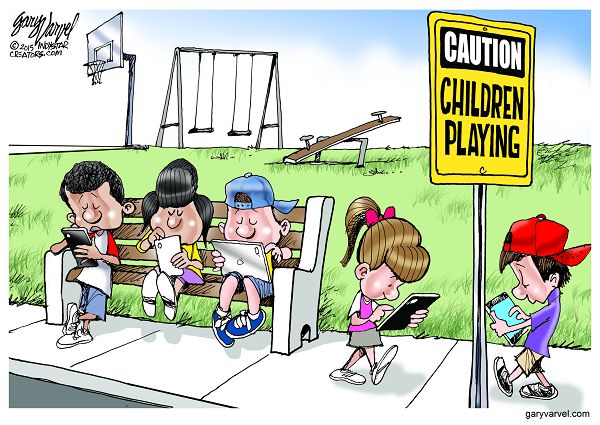
I recently found this comic and it really brought home the point of how times have changed in my lifetime. The addictive behavior of technology is a powerful force. The most recent impact is the closing of nearly 800 Toys R Us Stores in the USA. Yet this is only the beginning of how Play will change and in turn impact our kids. Below is a article by Esther Entin and published in The Atlantic that is important for all parents. It makes me realize that Overnight Summer Camp may be one of the last few areas that are tech free and dedicated to play.
What are your memories of playing as a child? Some of us will remember hide and seek, house, tag, and red rover red rover. Others may recall arguing about rules in kickball or stick ball or taking turns at jump rope, or creating imaginary worlds with our dolls, building forts, putting on plays, or dressing-up. From long summer days to a few precious after-school hours, kid-organized play may have filled much of your free time. But what about your children? Are their opportunities for play the same as yours were? Most likely not.
Play time is in short supply for children these days and the lifelong consequences for developing children can be more serious than many people realize.
THE DECLINE OF PLAY
An article in the most recent issue of the American Journal of Play details not only how much children's play time has declined, but how this lack of play affects emotional development, leading to the rise of anxiety, depression, and problems of attention and self control.
"Since about 1955 ... children's free play has been continually declining, at least partly because adults have exerted ever-increasing control over children's activities," says the author Peter Gray, Ph.D., Professor of Psychology (emeritus) at Boston College. Gray defines "free play" as play a child undertakes him- or her-self and which is self-directed and an end in itself, rather than part of some organized activity.
Gray describes this kind of unstructured, freely-chosen play as a testing ground for life. It provides critical life experiences without which young children cannot develop into confident and competent adults. Gray's article is meant to serve as a wake-up call regarding the effects of lost play, and he believes that lack of childhood free play time is a huge loss that must be addressed for the sake of our children and society.
WHO AND WHAT IS INTERFERING WITH CHILDREN'S PLAY?
Parents who hover over and intrude on their children's play are a big part of the problem, according to Gray. "It is hard to find groups of children outdoors at all, and, if you do find them, they are likely to be wearing uniforms and following the directions of coaches while their parents dutifully watch and cheer." He cites a study which assessed the way 6- to 8-year-olds spent their time in 1981 and again in 1997.
The researchers found that compared to 1981, children in 1997 spent less time in play and had less free time. They spent 18 percent more time at school, 145 percent more time doing school work, and 168 percent more time shopping with parents. The researchers found that, including computer play, children in 1997 spent only about eleven hours per week at play.
In another study, mothers were asked to compare their own memories of their playtime, to their children's current schedules. Eighty-five percent noted that their children played outdoors less frequently and for shorter periods of time than they had. The mothers noted that they restricted their own children's outdoor play because of safety concerns, a fact echoed in other surveys where parents mentioned child predators, road traffic, and bullies as reasons for restricting their children's outdoor play.
Adding to the problem, Gray notes, is our increasing emphasis on schooling and on adult-directed activities. Preschools and kindergartens have become more academically-oriented and many schools have even eliminated recess. It is not that anyone set out to do away with free play time. But its value has not been recognized. As a result, kids' free play time has not been protected.
FIVE WAYS PLAY BENEFITS KIDS
When children are in charge of their own play, it provides a foundation for their future mental health as older children and adults. Gray mentions five main benefits:
1. Play gives children a chance to find and develop a connection to their own self-identified and self-guided interests.
As they choose the activities that make up free play, kids learn to direct themselves and pursue and elaborate on their interests in a way that can sustain them throughout life. Gray notes that: "...in school, children work for grades and praise and in adult-directed sports, they work for praise and trophies.... In free play, children do what they want to do, and the learning and psychological growth that results are byproducts, not conscious goals of the activity."
2. It is through play that children first learn how to make decisions, solve problems, exert self control, and follow rules.
As children direct their own free play and solve the problems that come up, they must exert control over themselves and must, at times, accept restrictions on their own behavior and follow the rules if they want to be accepted and successful in the game.
As children negotiate both their physical and social environments through play, they can gain a sense of mastery over their world, Gray contends. It is this aspect of play that offers enormous psychological benefits, helping to protect children from anxiety and depression.
"Children who do not have the opportunity to control their own actions, to make and follow through on their own decisions, to solve their own problems, and to learn how to follow rules in the course of play grow up feeling that they are not in control of their own lives and fate. They grow up feeling that they are dependent on luck and on the goodwill and whims of others...."
Anxiety and depression often occur when an individual feels a lack of control over his or her own life. "Those who believe that they master their own fate are much less likely to become anxious or depressed than those who believe that they are victims of circumstances beyond their control." Gray believes that the loss of playtime lessons about one's ability to exert control over some life circumstances set the scene for anxiety and depression.
3. Children learn to handle their emotions, including anger and fear, during play.
In free play, children put themselves into both physically and socially challenging situations and learn to control the emotions that arise from these stressors. They role play, swing, slide, and climb trees ... and "such activities are fun to the degree that they are moderately frightening ... nobody but the child himself or herself knows the right dose."
Gray suggests that the reduced ability to regulate emotions may be a key factor in the development of some anxiety disorders. "Individuals suffering from anxiety disorders describe losing emotional control as one of their greatest fears. They are afraid of their own fear, and therefore small degrees of fear generated by mildly threatening situations lead to high degrees of fear generated by the person's fear of losing control." Adults who did not have the opportunity to experience and cope with moderately challenging emotional situations during play are more at risk for feeling anxious and overwhelmed by emotion-provoking situations in adult life.
4. Play helps children make friends and learn to get along with each other as equals.
Social play is a natural means of making friends and learning to treat one another fairly. Since play is voluntary and playmates may abandon the game at any time if they feel uncomfortable, children learn to be aware of their playmates' needs and attempt to meet them in order to maintain the play.
Gray believes that "learning to get along and cooperate with others as equals may be the most crucial evolutionary function of human social play ... and that social play is nature's means of teaching young humans that they are not special. Even those who are more skilled at the game's actions ... must consider the needs and wishes of the others as equal to their own, or else the others will exclude them." Gray cites increasing social isolation as a potential precursor to psychopathology and notes that the decline in play may be "both a consequence and a cause of the increased social isolation and loneliness in the culture."
5. Most importantly, play is a source of happiness.
When children are asked about the activities that bring them happiness, they say they are happier when playing with friends than in any other situation. Perhaps you felt this way when remembering your own childhood play experiences at the beginning of this article.
Gray sees the loss of play time as a double whammy: we have not only taken away the joys of free play, we have replaced them with emotionally stressful activities. "[A]s a society, we have come to the conclusion that to protect children from danger and to educate them, we must deprive them of the very activity that makes them happiest and place them for ever more hours in settings where they are more or less continually directed and evaluated by adults, setting almost designed to produce anxiety and depression."
THE LOSS OF PLAY AND RISE OF ANXIETY AND DEPRESSION
There has been a significant increase in anxiety and depression from 1950 to present day in teens and young adults and Gray cites several studies documenting this rise. One showed that five to eight times as many children and college students reported clinically significant depression or anxiety than 50 years ago and another documented a similar trend in the fourteen- to sixteen-year-old age group between 1948 and 1989.
Suicide rates quadrupled from 1950 to 2005 for children less than fifteen years and for teens and young adults ages 15-25, they doubled. Gray believes that the loss of unstructured, free play for play's sake is at the core of this alarming observation and that as a society, we should reassess the role of free play and the factors that seem to have all but eliminated it from our children's lives.
When parents realize the major role that free play can take in the development of emotionally healthy children and adults, they may wish to reassess the priorities ruling their children's lives. The competing needs for childcare, academic and athletic success, and children's safety are compelling. But perhaps parents can begin to identify small changes -- such as openings in the schedule, backing off from quite so many supervised activities, and possibly slightly less hovering on the playground that would start the pendulum returning to the direction of free, imaginative, kid-directed play.










